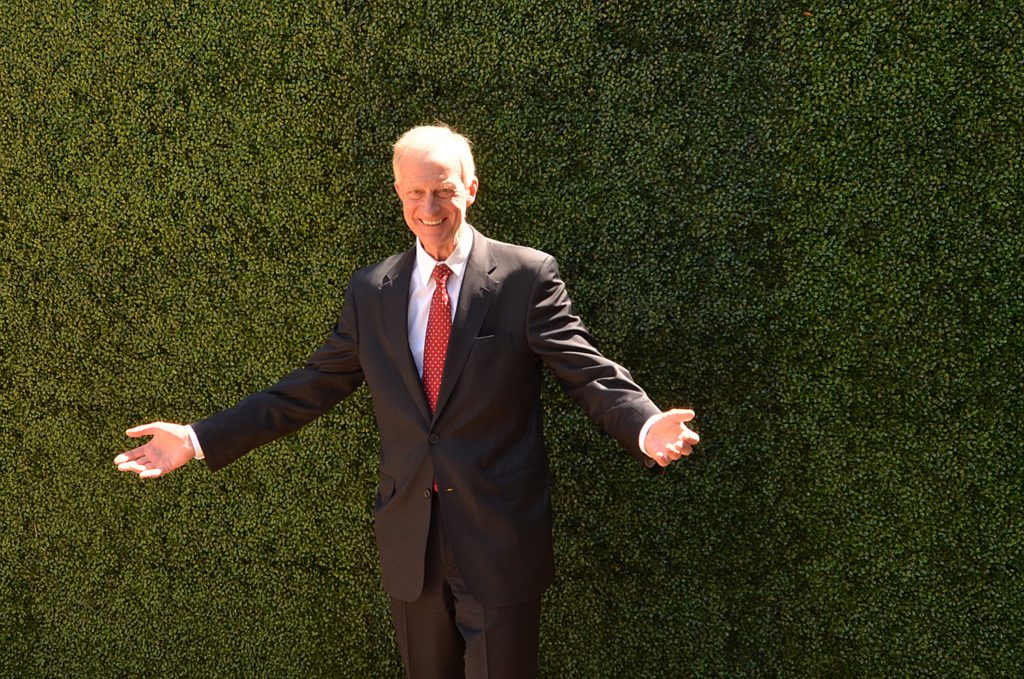Councilman Jack Evans: ‘Blue Dog’
By • June 20, 2018 0 1102

Jack Evans, the District of Columbia’s Ward 2 Council member, has been in office for more than a quarter of a century, since 1991. He is the longest serving Council member ever. The high walls of his spacious offices in the John A. Wilson Building downtown are a pictorial history of Washington personages and historic moments, including at least one Georgetowner cover — showing Evans in a tux at one of the 10,000 events he has attended over the past 27 years. At most of them, he probably delivered at least a short talk.
Ward 2 is a large, diverse chunk of the city. Along with the White House, the Ellipse and the National Mall, it comprises 11 distinct neighborhoods — Georgetown, the West End, Foggy Bottom, Dupont Circle, Chinatown, Logan Circle, Blagden Alley, Sheridan-Kalorama, Burleith, Hillandale and Penn Quarter — plus downtown Washington.
Evans chairs the Council’s Committee on Finance and Revenue as well as the Washington Metropolitan Area Transit Authority board of directors. He also serves on three standing committees: Transportation & Environment, Business & Economic Development and Government Operations.
“I love it all,” Evans proclaimed during an exclusive interview with The Georgetowner on May 31. “I plan to run for another four-year term in 2021. And probably after that if all goes well.” What he doesn’t plan to do is run for mayor again (he tried twice before).
Evans is exuberant about what he has helped to achieve in the District. The list of accomplishments includes improving the city’s infrastructure and “straightening out” its finances, resulting in many consecutive years of balanced budgets and current cash reserves of more than $2 billion. Just last month, Evans helped negotiate a three-way agreement — among D.C., Maryland and Virginia — to provide dedicated funding for the Metro system.
He’s experienced all of Georgetown’s ups and downs, from exploding manhole covers to the end of the liquor-license moratorium and the arrival of dozens of new stores and restaurants. But there remain many empty storefronts. “And we still don’t have a good hardware store,” Evans said.
“The biggest issue in Georgetown are the high rents,” stated the 64-year-old Council member, who graduated cum laude in economics from the University of Pennsylvania’s Wharton School of Business in 1975, then got his law degree at the University of Pittsburgh. “As long as owners are willing to wait for years to fill a space to get the higher rents they want, there’s not much we can do about it.”
Evans is thrilled about all the new families with children who have moved to Georgetown, and very conscious of “how difficult parenting can be.” He raised his triplets — now all college juniors — in a P Street townhouse as a single dad after his wife, Noel, died in 2003. “I know how important a supportive city school system and services are to help children grow to their full potential,” he has said.
“The Council just increased the schools’ budget by 3.9 percent, bringing the total to over$2.5 billion. That’s for some 80,000 students in the whole District. We spend more per student than any county in the entire United States,” Evans said with a sigh. “And we’re not seeing the results. Our graduation rates are low and a large percentage who do graduate really aren’t prepared for college-level work.”
The problem isn’t the schools, according to Evans. “The kids are at school from 8 a.m. to 3 p.m. and we’re pouring money into educational programs. The problem is what happens to the kids between 3 p.m. and 8 a.m. No one is really addressing those deeper sociological issues.”
As a fiscal conservative — a “Blue Dog Democrat” — Evans often says: “Many on the City Council think they are on the D.C. student council. They think they should just spend all the money you have.”
He is critical of the “loose” way public money is allotted. “Over 75 percent of the total$14.5-billion budget goes to personnel costs, not programs. And over 70 percent of the city personnel live in Virginia and Maryland, and spend most of their D.C. salaries out of the District.”
Evans is also adamant that out-of-District residents, including D.C. employees, must pay the out-of-District tuition required by law when their children attend District schools. Recent audits found that almost a third of the students at the Duke Ellington School of the Arts have their primary homes outside the District yet pay no tuition. It’s one of several scandals that the school system has endured this year, an election year for Mayor Muriel Bowser.
Evans has had some issues attached to his name as well. He said he couldn’t comment on a recent potential conflict-of-interest incident concerning digital sign company Digi Media, now under review. Then, there’s the “every-five-year” media buzz about the constituent service funds each Council member may or may not raise. His is the largest because of unspent mayoral campaign funds. Recently, at Evans’s request, the Council raised the cap on spending of such funds from $40,000 to $60,000. “I’d like to be able to spend more of it,” he said.
These things go in cycles, Evans said. A Democratic activist, he is a member of the Democratic National Committee and one of the electors who cast the District’s vote for president every four years. While he admits there are few active Republicans in D.C., still he feels the wide differences between Democrats make the politics here sufficiently diverse.
“It goes from fiscal conservatives, worried about the debt and the crunch that will come, to social-liberal lefties to the Bernie Sanders socialist wing of the Democratic party,” he said.

